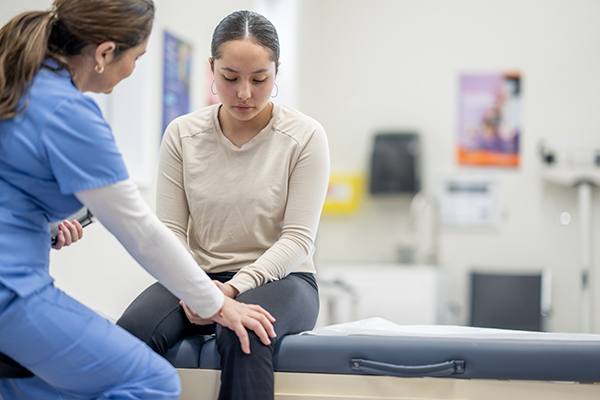The Specialized Need for Mental Health Support for Student-Athletes
For conversations about mental health, there’s a generational divide. Parents are often reluctant to talk about mental health with their kids — but kids are a lot more comfortable with the topic, says Kevin Fischer, Executive Director of National Alliance on Mental Illness (NAMI) Michigan.
In his role at NAMI, Fischer conducts programs alongside young people in recovery who tell their story from lived experience with substance use disorder or suicide attempts. And the most powerful part of the presentation, says Fischer, is the Q&A.
“Kids ask what it’s like to be in therapy, what it’s like to take medications. Kids want to have these conversations,” he says.
Through professional development with teachers, bus drivers, custodians, lunch aides and all the other adults who interact with students every day, Fischer recognizes the powerful — and often untapped — connection between student-athletes and athletic trainers.
“I met a gentleman who provides physical therapists and trainers to schools. He explained they have a unique issue where athletes are getting hurt and receiving therapy from trainers, and disclosing mental health issues and other issues at home,” Fischer says, adding that this contact was seeking training for the physical therapists and trainers to recognize and address these disclosures.
Recent media reports of professional athletes speaking out against the many pressures related to athletic performance have increased awareness of the mental health challenges often felt by athletes. Fischer says he has spoken with parents of college athletes who have been told to “suck it up” when they share mental health concerns with their coaches.
Why it’s not always easy for athletes to speak up about their mental health
Even student-athletes at the high school level can feel tremendous pressure to perform, and may not want to share with coaches or parents how they’re feeling. But athletic trainers can be viewed as removed enough from the student-coach relationship to offer a safe space to share mental health concerns.
To be prepared for these situations, NAMI does recommend that physical therapists and trainers receive some kind of evidence-based training related to mental health, including “Question-Persuade-Refer” (QPR) and Mental Health First Aid.
Through working with former Detroit Lions quarterback Eric Hipple, Fischer says he’s learned just how closely athletics and mental health can be intertwined.
“Eric told me that when we retire, we have an opportunity to plan, but athletes don’t have that,” Fischer says. For athletes, one bad game can mean the end of a career, and this can take a toll on an athlete’s mental health. “There are mental rigors related to being on top, being a starting quarterback, eating free meals everyday — and then you are nobody.” Following a suicide attempt of his own and losing his 15-year-old son to suicide, Hipple became an advocate for behavioral health awareness.
Although high school student-athletes are not at the pro level, they can be under immense pressure to perform by themselves or by coaches and parents. In a 2017 survey in the Orthopaedic Journal of Sports Medicine, just over 57% of parents of student-athletes said they hoped their child would play in college or professionally.
For parents of student-athletes and kids returning to school this fall, NAMI offers ongoing education and support groups in communities across Michigan through 15 affiliate organizations. “We touch 86% of our state’s population,” Fischer says. “Parents can contact NAMI to get recommendations on how to prepare for back to school. They can learn about what to do if their child is bullied or they notice changes in behavior. We are leading connectors for individual and family behavioral health resources.”
Through NAMI’s Family-to-Family, a free educational program for family and friends of people with mental health conditions, parents can learn from others with lived experience. This is just one program NAMI offers. Learn more at namimi.org.

